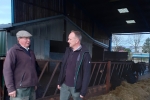Dr Neil Hudson, MP for Penrith and The Border and the only Veterinary Surgeon in the House of Commons, lent his expertise to a debate on the merits of the Government's innovative new Genetic Technology (Precision Breeding) Bill, designed to revolutionise the agrifood industry.
Designed to unlock the wide-ranging benefits of new gene editing technologies, the bill is part of the Conservative Government's drive to put the United Kingdom at the forefront of scientific research and innovation.
The technology in question allows scientists to alter genetic characteristics of plants and animals - in turn opening up myriad avenues to make species more resilient. This gene editing process is not to be confused with genetic modification which introduces exogenous genetic material to plants and animals.
Dr Hudson stood up again in the Commons to hail the great potential of the Bill. He pointed to the potential to develop resistance to diseases such as Avian Influenza that is currently ravaging the UK and Europe. In turn this will lessen our need for veterinary medicines, benefitting human public health by combatting antimicrobial resistance.
Moreover, with food security again coming into sharp relief since the war in Ukraine, the scope to produce climate resilient and disease resistant crops will reduce our reliance on pesticides and fertiliser. This will have a great impact on our precious environment and benefit our food producers.
The veterinary MP’s comments came during the Consideration of Lords Amendments late on Monday night. This is one of the final stages of the legislative process where MPs debate and decide on changes made to a bill by the House of Lords.
Speaking afterwards, Dr Neil Hudson, MP for Penrith and The Border, said:
"As a vet I was very happy again to speak in the Commons in support of this Genetic Technology Bill. I firmly believe it will really benefit both animal and human public health. We have an exciting opportunity to unlock the full might of the British scientific community and cement our place on the international stage as animal health and agrifood industry leaders.
"This proactive policy safeguards consumers while allowing innovations in animal health, farming productivity, environmental protection and much more."
Dr Hudson's full speech, as it appears in Hansard:
It is a pleasure to rise again in support of this important Bill. I declare a strong professional interest as a veterinary surgeon. I am passionate about animal health and welfare, and strongly believe that the Bill will help in that area.
The Bill has been strengthened and improved in the other place. Its definitions are also tighter. I am pleased that the Opposition amendment to remove animals from the Bill was withdrawn and has not been carried forward. It is so important that both animals and plants are included in the Bill. I was also pleased that the amendments that would have phased in animal provisions were not successful. That has strong benefits for animal health and welfare, and it is important that animals are included.
I very much welcome the Government’s allaying of concerns expressed by the Opposition about exogenous DNA, therefore preventing any exogenous DNA that was outside the range of an organism’s existing gene pool from remaining in the organism. Amendments 3, 5, 6, 8, 9 and 10 have been very helpful in that regard. It is important to reaffirm to the public and the world at large that this Bill is to do with gene editing, which is very, very different from genetic modification. That is where genetic material from exogenous or unrelated species can be introduced. That will not happen in this gene editing Bill.
I very much welcome the Government amendments that have removed reference to natural transformation. Some clarity was needed in that regard. I also welcome the fact that the Bill introduces more parliamentary scrutiny to help protect animal health and welfare, which strengthens the safeguards. This increased scrutiny will also allay some of the fears that people had put forward.
The Bill has huge benefits to animals, plants, the environment and people in, for example, helping to develop resistance to diseases such as avian influenza. A lot of work is being done to make birds resistant to this horrific disease. A huge outbreak has gripped this country and others across the world and that is firmly in our minds. This sort of technology will help us in that battle. It will also help us to develop resistance to other diseases, such as porcine reproductive and respiratory syndrome in pigs. It will help reduce the need for medicines, help combat antimicrobial resistance and, indirectly and very directly, help public health. It will also help us as a country and as a world in our fight to preserve and strengthen food security by being able to develop more climate-resilient and disease-resistant crops, reducing the need for pesticides and reducing the need for fertiliser as well. That will also benefit the environment.
In summary, I strongly support the Bill. I welcome the Government amendments. I thank the other place for refining and improving the Bill and I wish it well as it completes its passage.







